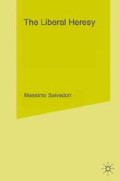Abstract
Mention of an ‘ism’ — from totalitarianism to its antinomy anarchism — brings to mind images both of ideas and institutions. In reality, an ‘ism’ indicates an ideological-political position founded on a set of principles, directed towards certain goals and aimed at the establishment of an institutional structure. It indicates the movement derived from the ideological-political position: endowed with its own identity; embracing a large, or fairly large, number of people. The set of principles includes concepts, values and a method of thinking; the range of concepts and values covers politics, economics, education, ethics and other aspects of the activities of the spirit, and also the complex web of relationships among and between individuals and groups. The goals may be one or many, absolute or relative, concrete or abstract, immediate or distant. The institutions have the function of channelling activities in such a way as to give concrete expression to concepts, values and goals. In a wide sense, an ‘ism’ is a way of life — or at least an aspiration towards it.
Preview
Unable to display preview. Download preview PDF.
Copyright information
© 1977 Massimo Salvadori
About this chapter
Cite this chapter
Salvadori, M. (1977). Liberalism: a Definition. In: The Liberal Heresy. Palgrave, London. https://doi.org/10.1007/978-1-349-15825-6_2
Download citation
DOI: https://doi.org/10.1007/978-1-349-15825-6_2
Publisher Name: Palgrave, London
Print ISBN: 978-0-333-21681-1
Online ISBN: 978-1-349-15825-6
eBook Packages: Palgrave Social & Cultural Studies CollectionSocial Sciences (R0)

